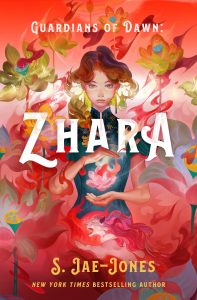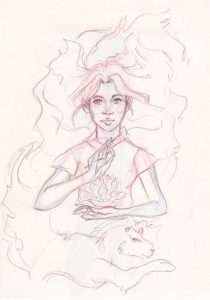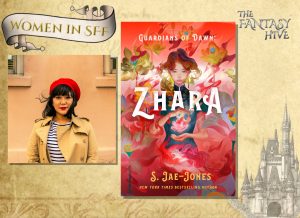Interview with S. Jae-Jones (GUARDIANS OF DAWN: ZHARA)
S. Jae-Jones (called JJ) is an artist, an adrenaline junkie, and the New York Times bestselling author of Wintersong and Shadowsong. Born and raised in Los Angeles, she now lives on the wrong coast, where she can’t believe she has to deal with winter every year. When not writing, JJ can be found working toward her next black belt degree in taekwondo, or indulging in her favorite hobby—collecting more hobbies. She tweets @sjaejones
Welcome to the Hive, JJ. Let’s start with the basics: tell us about Guardians of Dawn: Zhara – why should readers check it out?
Guardians of Dawn: Zhara is the first book of a new high fantasy YA series inspired by East Asia. Jin Zhara is a young magician who must learn how to use her growing powers to help restore the balance between order and chaos in the Morning Realms. If you like magical girl manga, Avatar: The Last Airbender, Korean rom-com dramas, and fairytales, then there is a high likelihood that you will also like Guardians of Dawn: Zhara.
Zhara has been described as Sailor Moon meets Cinder; that’s an epic mix of influences?
Zhara was really inspired by the need to pivot away from the dark, gothic, and angsty mood of my previous duology, Wintersong and Shadowsong. I love dark, gothic, and angsty, but my previous duology was very personal in ways I had not anticipated, especially with regards to mental health and creativity. Zhara was also written during the early days of the COVID-19 pandemic, so in many ways, it was inspired by everything I was consuming to find joy in at the time: fanfiction, fairy tales, the Dragon Age video game franchise, the Korean music group BTS, and all the magical girl manga and anime of my girlhood.

Give us an insight into your characters, who can we expect to meet? Do you have a favourite child?
Obviously I do not have favorite children, but I do have children who are perhaps more me than others. Zhara is my protagonist, and she’s a sweet girl who loves her younger stepsister dearly, and would do anything to protect them both from the abuses of her stepmother. But Han, the main male character, is essentially me as a 16-year-old, an asexual, ADHD himbo who likes to write really bad poetry. And although I didn’t quite intend it, I have also been told by my friends that Han’s best friend, Xu, is also me, but me now instead of the me I was as a teenager.
What inspired your worldbuilding? Can you tell us more about the magic system?
The magic system of Guardians of Dawn: Zhara was actually inspired by Chinese calligraphy, and the fact that a lot of countries in East Asia also used to learn Chinese characters, even if their own native alphabets or syllabaries were different. In Korean, we call Chinese characters hanja or hanmun, and it’s sort of the equivalent of learning Latin as an English speaker. A lot of spells in the western world are based off Latin, so I thought it would be kind of cool to do that for East Asian-inspired fantasy. I also thought about the system of elements and early attempts at scientific categorization and East Asian holistic medicine to build how the people of the Morning Realms saw and related to the world.
If you were transported into Jin Zhara’s world, how do you think you would fare?
I think I would do pretty well actually! I’m not a magician, so I don’t have anything to worry about on that front, not to mention I would just eat my way through all the delicious food there.
We see such varying opinions from authors when it comes to the time of editing their books. How have you found the editing process? Enjoyable, stressful or satisfying?
I have ADHD, which means I am motivated by novelty or interest rather than completion or reward like neurotypical brains. All this to say: I love first drafts and I hate revising, haha. Editing is incredibly stressful for me because the thing I fear most is tedium, and I am terrified that I will get bored of my book and want to abandon it when I revise. I usually have to trick myself into thinking I’m writing a whole new draft, so I reverse-outline the first draft with my editor’s notes, then basically…start over, but properly. Is this incredibly efficient? No. Does it work? Well…it gets me through revision, at least.
We always appreciate a beautiful book cover! How involved in the process were you? Was there a particular aesthetic you hoped the artist would portray?
I also adore the cover! I was fairly involved in the process as I had a pretty clear idea of what I wanted, which was a cover that was reminiscent of 90s magical girl manga covers (of which I had a plethora of references to send the cover artist). I am also a trained artist, so I sent over some sketches of composition ideas and basic character silhouettes to Sija Hong (my amazing artist), which she then incorporated. I’ve attached a quick compositional sketch I came up with as a thumbnail for the artist to refer to.

Just for fun, how would you pitch your book as a 1-star review?
I’m going to cheat here and pitch my ACTUAL favorite 1-star review of Zhara, which was that I “caved to the alphabet mafia ideology” and wrote “woke degeneracy” because I brought over a linguistic convention from East Asian languages—namely, that they do not have a gendered third person pronoun. As such, all characters in my book—named and otherwise—are ungendered until the character explicitly identifies themself.
Can you tell us anything about any upcoming projects? Or can you tell us a few teasers for your sequel?
I am working on the next book in the Guardians of Dawn series, each of which is inspired by a different western fairy tale. ZHARA is Cinderella, and Book 2 is Beauty & the Beast. I’ll let people guess about the others!
Who are the most significant women in SFF who have shaped and influenced your work?
My most formative reading years were between the ages of 8 and 12, but back when the boundary between children’s fiction and adult SFF was more porous. My most formative woman SFF writer is probably Madeleine L’Engle, the author of A Wrinkle in Time, as well as Diana Wynne Jones, especially Howl’s Moving Castle. Naoko Takeuchi, the artist and author of the Sailor Moon manga definitely inspired my penchant for magical girls, and Robin McKinley gave me my love of fairy tale retellings. I also adore Jacqueline Carey, and the highest compliment anyone paid me about my writing was my friend Roshani Chokshi, who called my debut novel “Labyrinth by way of Angela Carter.”
Who is a great woman in SFF who we should be reading? Any hidden gems?
I will read anything by Catherynne M. Valente, and a hidden gem is definitely Roshani Chokshi, who writes mythic fantasy with teeth.
Finally, what is the one thing you hope readers take away from your writing?
I have always written from a sense of joy and irreverent play, and if there’s anything people take away from my writing is that I hope it calls to people, like me, who are sincerely weird and weirdly sincere.
Thank you so much for joining us for Women in SFF!
Guardians of the Dawn: Zhara is due for release on the 1st of August from Titan Books You can pre-order your copy from Bookshop.org

